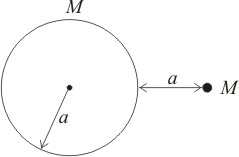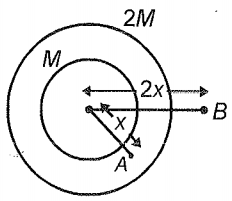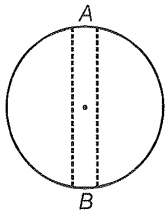Which one of the following plots represent
the variation of gravitational field on a
particle at distance r, due to a thin
spherical shell of radius R? (r is measured
from the centre of the spherical shell).
1. 2.
2.
3.  4.
4. 
 2.
2.
 4.
4. 
The distance between the centres of moon and earth is D. The mass of earth is 81 times the mass of the moon. At what distance from the centre of the earth the gravitational force will be zero ?
1. 2.
3. 4.
A particle of mass M is at distance 'a' from the surface of a thin spherical shell of mass M and radius a. If are the potentials at the centre and the surface of the shell respectively, then

1.
2.
3.
4. Can't say
Potential energy (U) and time period (T) of a satellite are related to each other as
1.
2.
3.
4.
The gravitational potential at the centre of a solid sphere is \(V.\) If the radius of the sphere is doubled while keeping its mass unchanged then, the gravitational potential on the surface of the new sphere will be:
1. \(2V\)
2. \(\dfrac{V}{2}\)
3. \(3V\)
4. \(\dfrac{V}{3}\)
Two concentric shells of uniform density of mass M and 2M are situated as shown in the figure. The ratio of forces experienced by a particle of mass m at position A and B is:

(1) 2:1
(2) 1:2
(3) 4:3
(4) 3:2
A tunnel has been dug through a diameter of a solid sphere of uniform mass density. Which graph best represents the variation of gravitational field intensity \(E\) with position \(r\) as one moves from \(A\) to \(B?\)

| 1. |  |
2. |  |
| 3. |  |
4. |  |
Assuming the earth as a uniform solid sphere of radius R, the gravitational field on its surface is x. The gravitational field inside at a distance from its surface is
(1) x
(2)
(3) 2x
(4)
Variation of gravitational field due to a uniform solid sphere of radius \(R\) with distance \(r\) from the centre is:
1. Straight line, for \(r<R\)
2. Hyperbolic, for \(r>R\)
3. Parabolic for \(r<R\)
4. Both (1) & (2)
Given below are two statements:
| Statement I: | The gravitational field due to earth is zero both at the center of the earth and at an infinite distance. |
| Statement II: | The gravitational potential of the earth is zero at the center of the earth and at infinity. |
| 1. | Statement I is false but Statement II is true. |
| 2. | Both Statement I and Statement II are true. |
| 3. | Both Statement I and Statement II are false. |
| 4. | Statement I is true but Statement II is false. |






